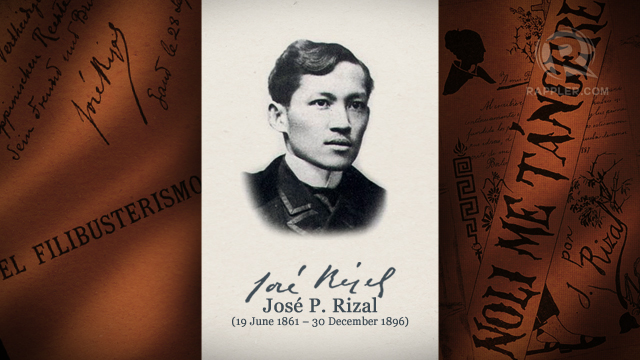SUMMARY
This is AI generated summarization, which may have errors. For context, always refer to the full article.

MANILA, Philippines – Sunday, December 30, marks the 116th year since the execution of national hero, Dr Jose Rizal. As we remember his death and celebrate his heroism, we thought it wise to look back at his words of timeless inspiration.
Here are some gems we found from Charles Derbyshire’s translations of El Filibusterismo and Noli Me Tangere, and from “The Philippines: A Century Hence.”
“There can be no tyrants where there are no slaves.” Spanish colonization lasted 3 centuries, and it lasted that long in part due to the choice of many Filipinos at that time to endure it and settle for what works. Rizal was not one of them. He believed in fighting for the ideal and ultimately taking control of one’s fate.
“The people do not complain because they have no voice; do not move because they are lethargic, and you say that they do not suffer because you have not seen their hearts bleed.” That people do not speak of injustice does not mean there is no injustice. Many times people are unaware of their oppression and see no need for change, but Rizal was a man who made known to Filipinos – primarily through his novels – the importance of not being blind to their oppression.
“He who does not know how to look back at where he came from will never get to his destination.” One of the most enduring quotes from Rizal, this is a timely reminder for everyone to remember both their roots and the people who helped them get to where they are.
“You know that the will of God is different from that of the priest; that religiousness does not consist of long periods spent on your knees, nor in endless prayers, big rosarios, and grimy scapularies, but in a spotless conduct, firm intention and upright judgment.” (From Gregorio Zaide’s translation of “To the Young Women of Malolos). Rizal knew that true spirituality is reflected by one’s character.
“Pure intuitive faith differs as much from fanaticism as fire from smoke, or music from mere noise; those who confuse the two are like the deaf.” While debate continues over Rizal’s un-Catholic pronouncements, it is certain Rizal believed in a kind of faith that is self-determined.
“Pearl of the Orient Sea, our Eden lost,
With gladness I give thee my Life, sad and repress’d;
And were it more brilliant, more fresh and at its best,
I would still give it to thee for thine welfare at most.”
Found in the first stanza of Rizal’s Mi Ultimo Adios, these words reflect Rizal’s commitment to national reform. Dead or alive, in bad or good condition, his life was dedicated to the country’s welfare.
“Hold high the brow serene,
O youth, where now you stand;
Let the bright sheen
Of your grace be seen,
Fair hope of my fatherland!”
Rizal was a firm believer in the youth being the hope of the nation. The stanza comes from Charles Derbyshire’s translation of “Sa Aking Mga Kababata,” a poem Rizal wrote when he was 8 years old.
“The Filipino loves his country no less and although he is quieter, more peaceful and with difficulty stirred up, once aroused he does not hesitate. And for him the struggle means death to one or the other combatant. He has all the meekness and all the tenacity and ferocity of his carabao. Climate affects bipeds in the same way that it does quadrupeds.” This comes from Rizal’s seminal essay, “Philippines: A Century Hence,” published in 4 parts in La Solidaridad.
“Necessity is the most powerful divinity the world knows – it is the result of physical forces set in operation by ethical forces.” Also from “Philippines: A Century Hence,” this summarizes the point of the essay: that by necessity people will break their silence and revolt against the cruelty of their circumstances.
“When you receive this letter, I shall be dead by then. Tomorrow at seven, I shall be shot; but I am innocent of the crime of rebellion. I am going to die with a tranquil conscience.” With a tranquil conscience, Jose Rizal was executed. This was written by him in his final letter to Prof Fernando Blumentritt, a close friend whom he addressed as “my dear brother.”
Rizal did not just stand up to the bullies of his generation. He made sure he knew who the bullies were, made others understand why the bullying was wrong, and looked forward to the day when the bullying days would end.
We have constructed our own heroic prototypes since then, but Rizal’s legacy remains. His intelligence was complemented by kindness, unrestrained courage driven by sound principle, and tough speech resulting from careful thought. – Rappler.com
What about you? Would you like to share your thoughts on Rizal? Email desk@rappler.com or tag @rapplerdotcom on Twitter!
Add a comment
How does this make you feel?
There are no comments yet. Add your comment to start the conversation.